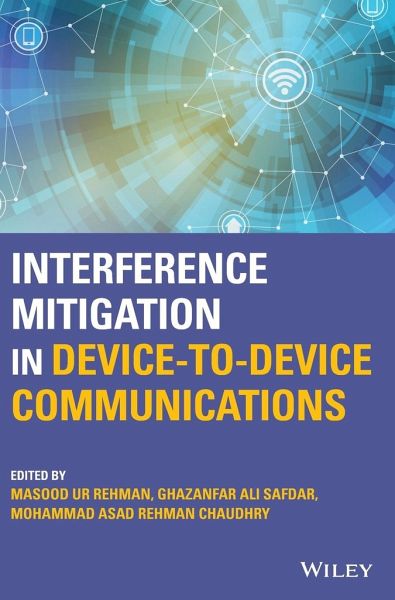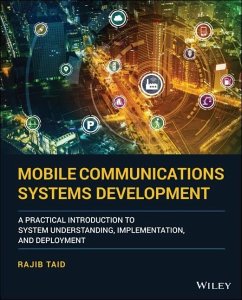
Interference Mitigation in Device-To-Device Communications
Versandkostenfrei!
Versandfertig in über 4 Wochen
119,99 €
inkl. MwSt.
Weitere Ausgaben:

PAYBACK Punkte
60 °P sammeln!
Explore this insightful foundational resource for academics and industry professionals dealing with the move toward intelligent devices and networksInterference Mitigation in Device-to-Device Communications delivers a thorough discussion of device-to-device (D2D) and machine-to-machine (M2M) communications as solutions to the proliferation of ever more data hungry devices being attached to wireless networks. The book explores the use of D2D and M2M technologies as a key enabling component of 5G networks. It brings together a multidisciplinary team of contributors in fields like wireless commun...
Explore this insightful foundational resource for academics and industry professionals dealing with the move toward intelligent devices and networks
Interference Mitigation in Device-to-Device Communications delivers a thorough discussion of device-to-device (D2D) and machine-to-machine (M2M) communications as solutions to the proliferation of ever more data hungry devices being attached to wireless networks. The book explores the use of D2D and M2M technologies as a key enabling component of 5G networks. It brings together a multidisciplinary team of contributors in fields like wireless communications, signal processing, and antenna design.
The distinguished editors have compiled a collection of resources that practically and accessibly address issues in the development, integration, and enhancement of D2D systems to create an interference-free network. This book explores the complications posed by the restriction of device form-factors and the co-location of several electronic components in a small space, as well as the proximity of legacy systems operating in similar frequency bands.
Readers will also benefit from the inclusion of:
_ A thorough introduction to device-to-device communication, including its history and development over the last decade, network architecture, standardization issues, and regulatory and licensing hurdles
_ An exploration of interference mitigation in device-to-device communication underlaying LTE-A networks
_ A rethinking of device-to-device interference mitigation, including discussions of the challenges posed by the proliferation of devices
_ An analysis of user pairing for energy efficient device-to-device content dissemination
Perfect for researchers, academics, and industry professionals working on 5G networks, Interference Mitigation in Device-to-Device Communications will also earn a place in the libraries of undergraduate, graduate, and PhD students conducting research intowireless communications and applications, as well as policy makers and communications industry regulators.
Interference Mitigation in Device-to-Device Communications delivers a thorough discussion of device-to-device (D2D) and machine-to-machine (M2M) communications as solutions to the proliferation of ever more data hungry devices being attached to wireless networks. The book explores the use of D2D and M2M technologies as a key enabling component of 5G networks. It brings together a multidisciplinary team of contributors in fields like wireless communications, signal processing, and antenna design.
The distinguished editors have compiled a collection of resources that practically and accessibly address issues in the development, integration, and enhancement of D2D systems to create an interference-free network. This book explores the complications posed by the restriction of device form-factors and the co-location of several electronic components in a small space, as well as the proximity of legacy systems operating in similar frequency bands.
Readers will also benefit from the inclusion of:
_ A thorough introduction to device-to-device communication, including its history and development over the last decade, network architecture, standardization issues, and regulatory and licensing hurdles
_ An exploration of interference mitigation in device-to-device communication underlaying LTE-A networks
_ A rethinking of device-to-device interference mitigation, including discussions of the challenges posed by the proliferation of devices
_ An analysis of user pairing for energy efficient device-to-device content dissemination
Perfect for researchers, academics, and industry professionals working on 5G networks, Interference Mitigation in Device-to-Device Communications will also earn a place in the libraries of undergraduate, graduate, and PhD students conducting research intowireless communications and applications, as well as policy makers and communications industry regulators.













